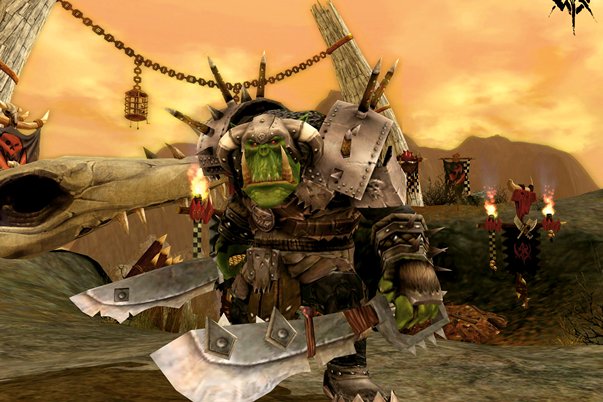Warhammer Online: Age of Reckoning - Creative Director speaks
The age of reason fails. Time for war
Sensibly, they've gone for the core values. "One of the things we had to decide early on is..." Paul muses, "Well, our game is Warhammer. It's not farm-hammer. It's not making-T-shirts-hammer. It's not dancing-hammer. It's Warhammer. Therefore, though there are these elements in other games, it's not of much interest to us. And that's difficult, because we have this obsession with 'Don't you have to appeal to all these different game styles?' And in short, no, you don't. Pick a great idea- war - and then realize that idea in the most wondrous way you can."
"If you don't have an absolute brutal vision you will not move from, it will be corrupted and thwarted by people who don't know what they're talking about," Paul elaborates. "If you're going to make a gory horror-slasher flick, tell people it's a gory horror-slasher flick. At that point, you only have to do two things. One, make sure it's a gory horror-slasher flick - that is, put gore, horror and slashing in it - and two, tell people it's a gory horror-slasher flick. That way, no one can be disappointed. Horror-slasher fiends come, are very happy, and everyone else who thought it was a romantic comedy about gay cowboys stays well away. It's the same with our game. Our vision is just a way of saying 'This is what we stand for. This is what we%26rsquo;re doing.' If you don't like it, have no fear. If you think you might be interested, come and have a go. And if you have a go, we're pretty confident that you'll like it."

To that end, everything in the game is focused on losing you in a world which is at near-constant war. Your initial experience won't be in a distant village with casual quests like in most games. Your village will be under immediate threat- or, in the case of Chaos, it'll be you who's immediately threatening a village.
This sense of a world on the edge of collapse is emphasized by one of the game's major new innovations: that of public quests. These are attempts to increase the simple joy of being in a multiplayer environment, by allowing players to interact in groups without anything as formalized as actually grouping. A public quest activates when players walk into an area, for anyone to join in on. It moves to a further stage and eventually climaxes, rewarding participants in proportion to their contribution to the event.
Two examples from the sections we played: in the Empire, villagers were being menaced by a group of Chaos Marauders. We rescued them and a wave of Norse berserkers arrived to be dealt with. Then, finally, a Chaos Giant strode in to be brought down by massed fire. War! Alternatively, playing as Chaos, we received a suitably monstrous mission to destroy a village. This involved first clearing a graveyard of guards, then going from gravestone to gravestone to set up a magical ritual. This summoned a demon of Machiavellian-bastard Chaos God Tzeench, which in turn led anyone present to attack the defending Bright Wizards of the Empire. War!
Weekly digests, tales from the communities you love, and more


